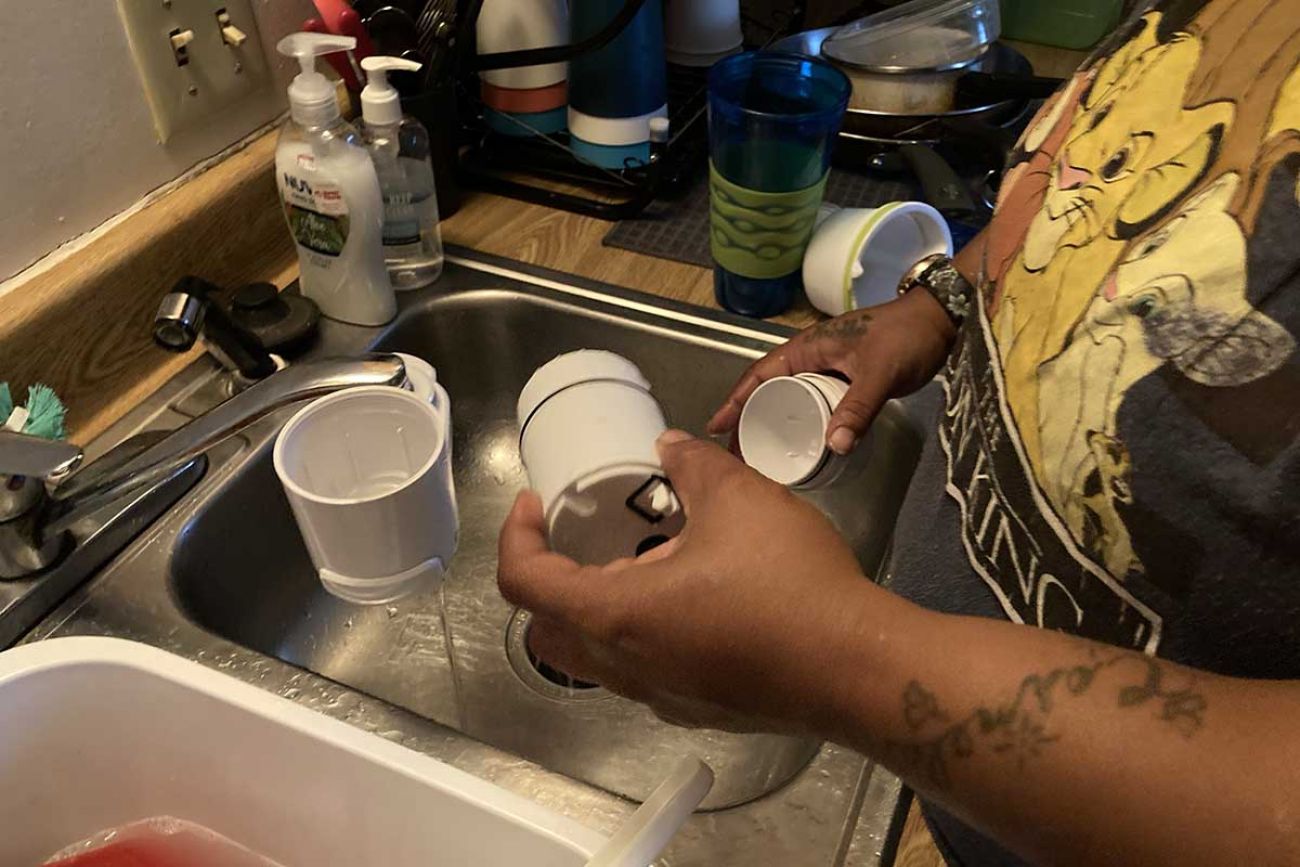Benton Harbor activists: We need more proof city's drinking water is safe

Five months after state and federal regulators flagged Benton Harbor’s drinking water system for a host of deficiencies — from pooling chemicals to broken water treatment equipment — those regulators say the water flowing from the city’s treatment plant meets federal standards.
Some problems remain at the plant, they say, but they are being addressed and none of them pose a threat to residents’ drinking water.
But local water activists say they need more proof.
Related:
- Federal watchdog will probe EPA response to Benton Harbor water crisis
- Michigan environmental leader admits flaws with Benton Harbor lead crisis
- Amid lead crisis, EPA orders Benton Harbor to fix water quality violations
On Monday, they called on the state to provide more details about recent Safe Drinking Water Act concerns at the city water treatment plant, and require public notices detailing regulators’ concerns to city residents who may still be unaware of the issues.
They also panned state police investigators for what they call “intimidation tactics” tied to an investigation of volunteer water deliveries in the afflicted city.
It’s the latest dustup for a water system that is in the midst of a yearslong crisis over high lead levels in residents’ tap water.
State officials began advising local residents to drink bottled water in October, after activists complained to the U.S. Environmental Protection Agency that state and local government officials weren’t taking seriously the lead problems that first emerged in 2018.
But activists argue state health officials have offered mixed messages about the safety of Benton Harbor’s tap water by providing free bottled water while also stressing that in-home filters are effective at stripping away lead. Ongoing challenges at the treatment plan only compound the uncertainty.
“Filters are great and necessary for reducing lead exposure when there are no issues at the water treatment plant,” said Elin Betanzo, a water engineer and former EPA official who now runs the firm Safe Water Engineering LLC. “However, these filters are only certified to reduce lead, not microbial contaminants.”
Betanzo and other clean water advocates said they worry the treatment plant’s deficiencies could create opportunities for bacteria to leech into treated drinking water.
From there, they fear the pathogens could harm Benton Harbor residents who continue to use water filters instead of bottled water. Most home water filters are not designed to strip away bacteria, which can instead grow inside the filters.
Activists’ concern stems from state and federal inspections last fall that revealed an array of Safe Drinking Water Act violations and deficiencies at the city water treatment plant. Regulators warned that failing equipment and filters, staffing shortages and other problems threatened the plant’s ability to deliver clean water to Benton Harbor’s 9,100 residents.
Since then, plant operators have been working to address the problems. A follow-up inspection in February counted four ongoing “compliance issues,” but EPA officials noted that “none of those issues cited during the inspection currently impact water quality in Benton Harbor.”
EPA spokesperson Taylor Gillespie told Bridge Michigan Monday that agency officials meet regularly with state and local officials to monitor the city’s progress at the plant.
Gillespie said EPA drinking water experts have reviewed 13 months of monitoring data, determining that the water is meeting Safe Drinking Water Act requirements for chlorine, a chemical used to kill bacteria and viruses.
Likewise, EGLE spokesperson Hugh McDiarmid said routine testing of treated tap water at “multiple points in the system” has turned up no bacteria concerns since 2018.
“There are no current deficiencies in how Benton Harbor treats its water for bacteria,” McDiarmid said, “and monitoring data from multiple sample locations confirm that.”
But activists want more assurance.
Nick Leonard, director of the Great Lakes Environmental Law Center, said his group and others submitted a letter to EGLE, the EPA and the Michigan Department of Health and Human Services in February, requesting public notices to alert residents to the plant’s problems, meetings between regulators and water activists, and more specifics about what’s been done to fix the problems.
“Rather than meet those asks, the state has essentially waffled on the simple and essential question of whether Benton Harbor water is safe to drink,” Leonard said.
Activists also panned the Michigan State Police for an investigation focused on local water distribution efforts. Rev. Edward Pinkney, leader of the Benton Harbor Community Water Council, said police officers showed up at his doorstep late last month, “telling me that the Benton Harbor Community Water Council was taking water to South Bend and selling it.”
Pinkney denied that, calling the allegations “the most ridiculous thing I’ve ever heard.”
Michigan State Police spokesperson Shanon Banner confirmed that the agency is investigating “potential improprieties with a water distribution contractor,” but would not provide further details.
While regulators and activists spar over transparency, crews are working to remove thousands of lead service lines from the city’s water delivery system, aided by tens of millions of dollars from the state.
As of Monday, 1,215 lead lines had been replaced or verified as lead-free. The state aims to inspect and, if needed, replace another 3,166 by summer 2023.
The future of the city’s struggling water treatment plant is less clear. The plant, which is operating at well below its capacity as a result of longstanding population loss, industry loss and neighboring communities’ departure from the Benton Harbor system, needs millions of dollars in repairs plus more investment in ongoing maintenance. It’s unclear where the money will come from.
Michigan Environment Watch
Michigan Environment Watch examines how public policy, industry, and other factors interact with the state’s trove of natural resources.
- See full coverage
- Subscribe
- Share tips and questions with Bridge environment reporter Kelly House
Michigan Environment Watch is made possible by generous financial support from:
Our generous Environment Watch underwriters encourage Bridge Michigan readers to also support civic journalism by becoming Bridge members. Please consider joining today.
See what new members are saying about why they donated to Bridge Michigan:
- “In order for this information to be accurate and unbiased it must be underwritten by its readers, not by special interests.” - Larry S.
- “Not many other media sources report on the topics Bridge does.” - Susan B.
- “Your journalism is outstanding and rare these days.” - Mark S.
If you want to ensure the future of nonpartisan, nonprofit Michigan journalism, please become a member today. You, too, will be asked why you donated and maybe we'll feature your quote next time!






